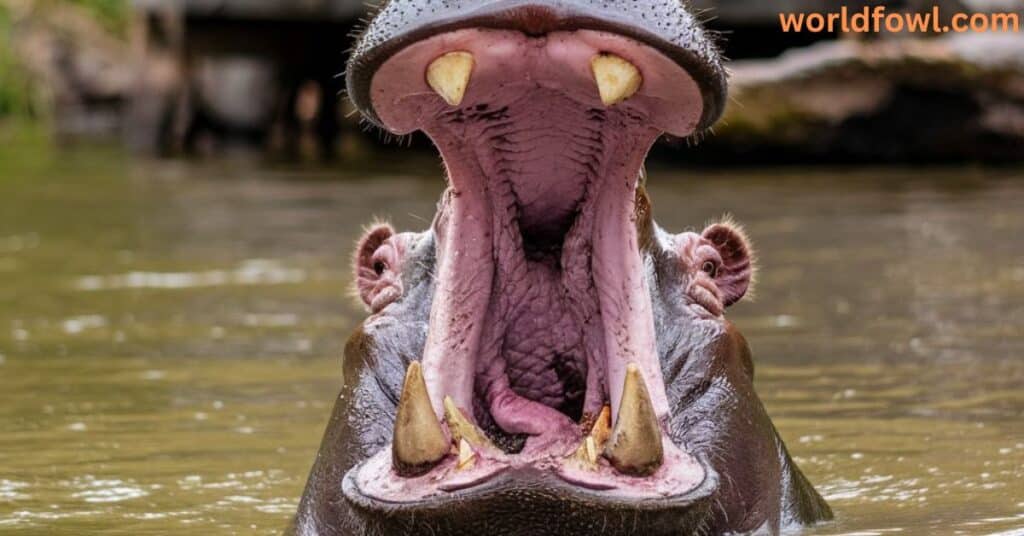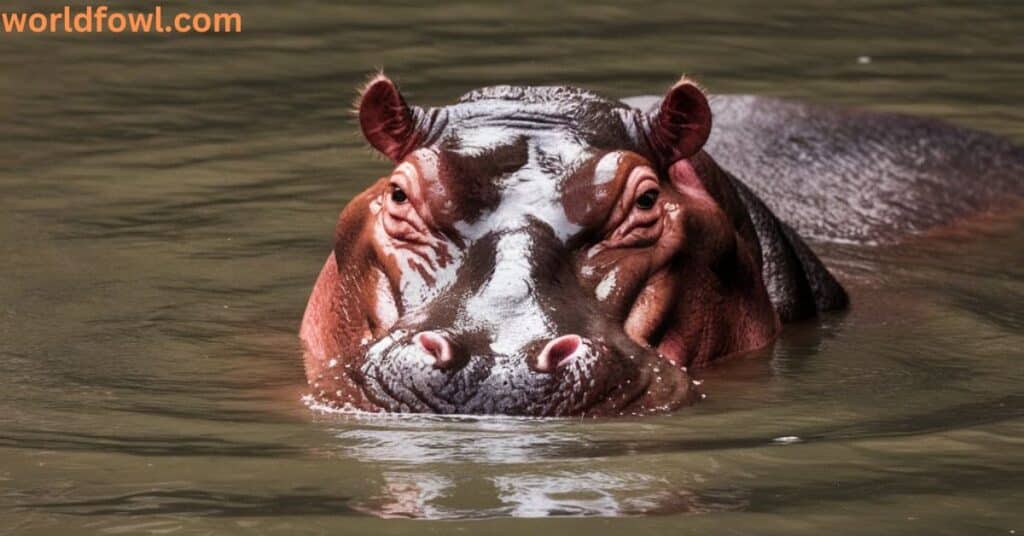When you picture a hippopotamus, it’s easy to imagine a serene, water-loving giant, spending its days floating lazily in a river or lake. After all, hippos have often been depicted as cute, plump creatures in popular culture. But beneath this seemingly peaceful image, there’s a darker, far more dangerous side to these animals. Do hippos attack humans? The shocking answer is yes, and it’s more common than most people think.
In fact, hippos are among the most dangerous animals in Africa, causing more human fatalities each year than many of the continent’s most iconic predators. Their aggressive behavior, territorial instincts, and sheer size make them a serious threat. This article will take an in-depth look at why hippos attack humans, explore their territorial behavior, defensive instincts, and mating aggression, and provide critical advice on how to stay safe in areas where hippos are prevalent.
By the end, you’ll understand the real dangers these creatures pose, and you’ll be equipped with the knowledge to avoid becoming a part of the ever-growing statistics of hippo attacks.
What Are Hippos? Understanding These Massive Mammals

Before we dive into the specifics of hippo attacks and why they happen, it’s essential to first understand the animals themselves. Hippos are large mammals native to sub-Saharan Africa, and they are surprisingly dangerous, despite their usually docile and slow-moving image.
Physical Characteristics of Hippos
A fully grown hippopotamus can weigh up to 4,000 pounds and reach lengths of 14 feet. Their massive size alone makes them a force to be reckoned with. In fact, they have one of the most powerful bite forces in the animal kingdom. A hippo bite force can reach up to 1,800 pounds of pressure—enough to crush bones, break through boats, and cause severe injury to anything in their path.
What’s even more surprising is their speed. Although their bulk might suggest otherwise, hippos are capable of running as fast as 19 miles per hour on land. This is faster than most humans can run, which makes them incredibly dangerous if they feel threatened or provoked.
Additionally, hippos are excellent swimmers, spending much of their time submerged in water to regulate their body temperature and protect their sensitive skin. They can remain submerged for several minutes at a time, rising to the surface to breathe. Hippos can stay in the water for hours, only emerging at dusk to feed on grasses.
Hippos in the Wild
They are herbivores, feeding primarily on grass, but they need to consume large amounts of vegetation—sometimes up to 80 pounds in a single night. They are most active at night, grazing in large open areas. While they can be found in various river systems and lakes throughout sub-Saharan Africa, they tend to prefer slow-moving rivers, lakes, and marshes.
In these areas, hippos live in groups known as “pods,” which can consist of several individuals, including males, females, and their young. These pods often serve as a defense mechanism, providing safety from predators and offering a way for the hippos to protect their young.
See Also : Do Kodiak Bears Attack Humans?
Why Do Hippos Attack Humans?

Now that we know a little more about hippos, let’s take a deep dive into the main question: Do hippos attack humans, and if so, why?
Territorial Behavior
One of the primary reasons that hippos are so dangerous is their territorial behavior. Hippos are highly protective of their space, particularly when they are in the water. This territorial nature becomes especially pronounced when they are in rivers, lakes, or wetlands, which they view as their domain.
If you get too close to a hippo’s territory, you may provoke an attack. Hippos don’t have the same sense of personal space that we humans do. They view anything that enters their territory as a threat. Boats, canoes, and even other animals that wander too close to their favorite water hole can be met with immediate aggression.
In many cases, hippos are territorial about the areas they use for feeding, which can lead to violent clashes with humans. In particular, fishermen and boaters are often at risk, as they inadvertently encroach on hippo territories. The hippos will charge the intruders, often capsizing boats or attacking people directly.
Defensive Instincts
Hippos are also incredibly protective of their young. Their defensive instincts come into play when a hippo feels that its calves are in danger. Hippo mothers are known to be fiercely protective of their babies, and they will attack anyone or anything that threatens them. This includes humans who venture too close to a mother and her calf.
In fact, hippos have been known to chase people and vehicles if they feel their young are at risk. The defensive wildlife instincts of hippos are extremely strong, and they don’t hesitate to act aggressively if they believe their offspring are in jeopardy.
Mating Aggression
Another factor contributing to hippo attacks is mating aggression. During the breeding season, male hippos become much more territorial and aggressive. When competition for mates is high, male hippos may attack each other in brutal confrontations. This territorial aggression can also extend to humans who inadvertently enter their area.
During this period, male hippos are more likely to charge boats, vehicles, and anyone else they perceive as an intruder. The combination of territorial and mating aggression makes the breeding season especially dangerous for anyone in hippo-prone areas.
See Also : Do Foxes Attack Humans? The Chilling Truth!
Are Hippo Attacks Dangerous?

It’s clear that hippos attack humans for several reasons, but how dangerous are these attacks? Are hippos really the deadly creatures they seem to be, or is the threat exaggerated? Let’s break down the risks.
The Reality of Hippo Attacks
As mentioned earlier, hippos are among the most deadly animals in Africa. They kill more people every year than lions, crocodiles, and even elephants. In fact, it’s estimated that hippos are responsible for over 500 human fatalities annually in Africa. This is a startling statistic when you compare it to other large predators in the region.
What makes hippo attacks so dangerous is the sheer power of these animals. Their bite force is one of the strongest in the animal kingdom, and their ability to move quickly both on land and in water gives them an edge when it comes to surprise attacks. Hippos are often very fast and unpredictable, which makes it difficult for humans to evade them once an encounter has started.
The Power of the Hippo Bite
When it comes to physical force, the hippo bite force is something to be reckoned with. A single bite can crush bones and cause fatal injuries. Hippos use their large tusks—sharp canine teeth that can grow up to 20 inches long—as weapons during a fight. These tusks are not just for show; they can inflict serious harm to other animals and humans.
In water, a hippo’s bite force can easily tear through boat hulls, making boats vulnerable to attack if they enter a hippo’s territory. In fact, there have been several reports of boats being overturned or even destroyed by hippos when humans or other animals get too close to them.
Real-Life Case Studies: Hippo Attacks
There have been numerous cases where hippos have attacked humans and caused serious injury or death. For example, in a popular wildlife park in Uganda, a family of tourists was attacked while on a boat safari. The hippo charged the boat, capsized it, and threw the tourists into the water. One person tragically lost their life. While this is an extreme case, it’s not isolated. Hippo attacks on boats, kayaks, and fishermen are surprisingly common in Africa, especially in regions with dense hippo populations.
See Also : Do Capybaras Attack Humans? The Truth!
How to Avoid Hippo Attacks

Now that we’ve discussed how dangerous hippos can be, let’s focus on how to stay safe in areas where these creatures live. Whether you’re planning a trip to Africa or just learning about wildlife, it’s important to know how to avoid hippo attacks.
Respect Their Territory
One of the most important rules when encountering hippos is to respect their space. Never get too close to hippos, especially near water. These animals are highly territorial, and getting too close to their domain can lead to an attack. Always keep a safe distance from hippos, even if they appear calm.
Stay Safe on Water
Boating and kayaking in areas known to have hippos is extremely risky. Avoid entering these areas if you’re unsure about the presence of hippos. If you’re traveling on a boat, make sure it’s large enough to withstand a possible attack. Additionally, always stay aware of your surroundings when boating near rivers or lakes.
Avoid Mating Seasons
The mating season is a particularly dangerous time to be around hippos. Male hippos become more aggressive during this time, and you may inadvertently get caught in the crossfire. If possible, avoid hippo habitats during the breeding season to reduce the risk of encountering aggressive males.
Watch Out for Mothers and Calves
Hippos are fiercely protective of their young. If you see a hippo calf, be sure to keep your distance from the mother as well. Hippo mothers will not hesitate to charge at anyone who poses a threat to their young, and they can be fast and aggressive when protecting their calves.
Final Verdict: Do Hippos Attack Humans?
The evidence is clear: hippos attack humans more frequently than most people realize. Their territorial behavior, defensive instincts, and mating aggression make them a serious threat to anyone who enters their domain. Despite their appearance, hippos are powerful, fast, and dangerous animals capable of causing significant harm to humans.
While hippo attacks are more common in sub-Saharan ecosystems, they can occur anywhere hippos are found, including rivers and lakes in national parks. Understanding these animals’ behavior, especially during mating season or when they are with their calves, can help minimize the risk of attacks.
In the end, hippos are an important part of Africa’s wildlife, but they require respect and caution. With the right knowledge, you can stay safe while enjoying the beauty of Africa’s wild places.
See Also : Do Sea Lions Attack Humans? Terrifying Tales!
FAQs
How many people do hippos kill each year?
It is estimated that hippos are responsible for over 500 human fatalities annually in Africa, making them one of the deadliest animals on the continent.
What makes hippos so aggressive?
Hippos are highly territorial animals with strong defensive instincts. Their aggressive nature is also heightened during the mating season, when mating aggression becomes a factor.
Can hippos outrun humans?
Yes, hippos can run up to 19 miles per hour on land, which is faster than most humans. They are also very fast swimmers, making them difficult to escape from in water.
What do you do if a hippo charges at you?
If a hippo charges at you, your best option is to find shelter in a vehicle or a building. If you are on water, get away as quickly as possible.
Are hippos more dangerous than other animals in Africa?
Yes, hippos kill more humans each year than lions, crocodiles, and elephants, making them one of the most dangerous animals in Africa.
Conclusion: The Deadly Secret of Hippos Unveiled
Do hippos attack humans? Absolutely. Their unpredictable behavior, territorial nature, and sheer power make them a serious threat. Understanding the factors behind hippo attacks—from defensive instincts to mating aggression—is essential for anyone spending time in hippo habitats. Whether you’re visiting Africa or simply learning about these fascinating creatures, remember to approach them with respect and caution. With proper knowledge and awareness, you can avoid becoming part of the hippo attack statistics and stay safe while experiencing the wild.

Henry James is a seasoned blogger and a passionate storyteller on “World Fowl.” With years of experience crafting engaging content, he brings a unique blend of expertise and creativity to his writing. Henry specializes in exploring diverse topics with depth and clarity, captivating readers worldwide.







